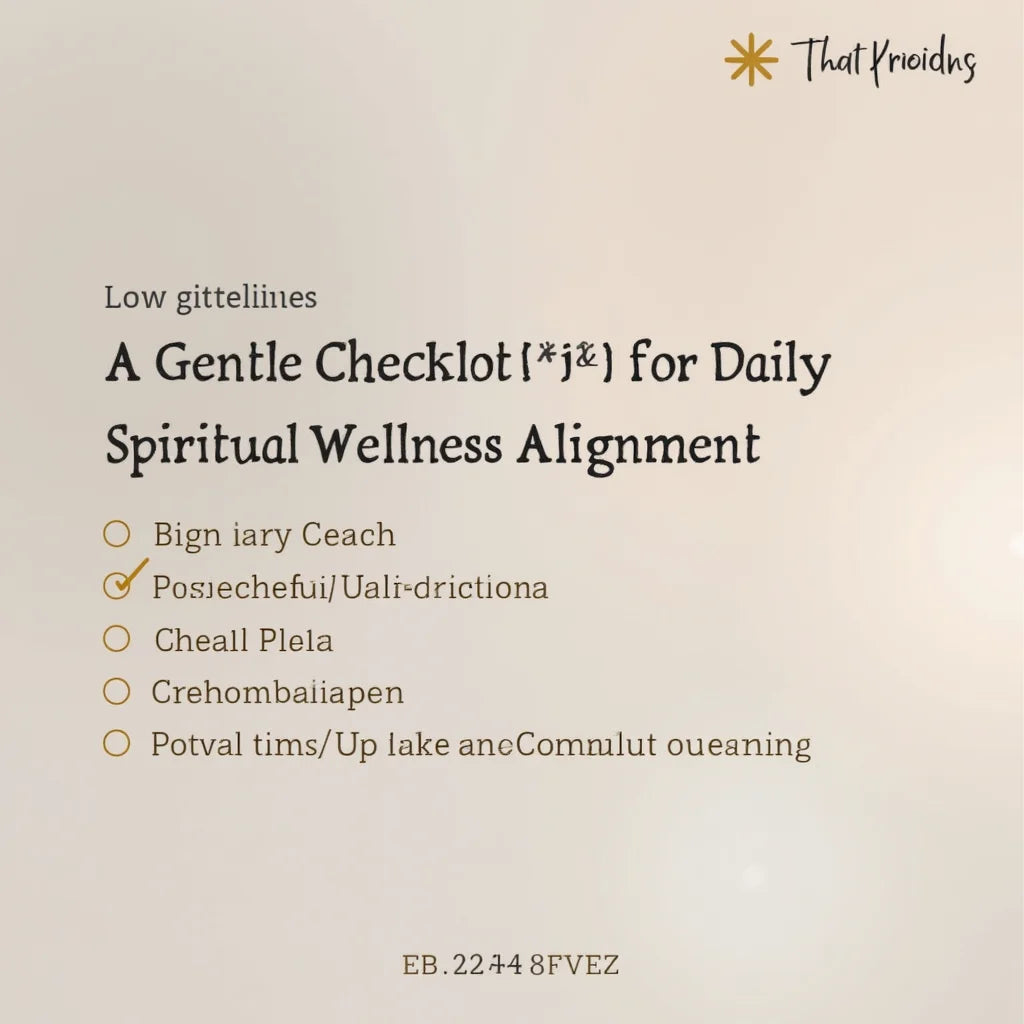
A Gentle Checklist for Daily Spiritual Wellness Alignment
Share
Updated on: 2025-10-28
Spiritual Wellness Table of Contents
- Spiritual Wellness for Everyday Life: Why it matters
- Spiritual wellness activities for beginners
- Product spotlight: Tools that support spiritual wellness
- Spiritual wellness myths vs. facts
- Frequently asked questions on spiritual wellness
- Final recommendations for nurturing spiritual wellness
Spiritual Wellness for Everyday Life: Why it matters
Spiritual Wellness is a gentle, ongoing exploration of what gives your life meaning, purpose, and connection. When people speak of spiritual well-being or spiritual health, they often refer to feeling aligned with their values and more present in daily moments. This article offers a calm, practical overview of spiritual wellness within a holistic wellness approach, with ideas you can adapt at your own pace. If you are new to the topic and wondering, “What is spiritual wellness and why is it important?”, you will find simple answers and thoughtful suggestions to help you start with confidence.
What is spiritual wellness and why is it important?
Spiritual wellness is the practice of nurturing your inner life so you feel more grounded, clear, and connected. It can be expressed in many ways—quiet reflection, mindful movement, compassionate action, time in nature, or community service. There is no single right way. The importance of spiritual wellness often shows up in everyday life: it can encourage thoughtful choices, steady your attention, and bring a sense of meaning to routine tasks. Many people find that when they devote gentle attention to spiritual well-being, it becomes easier to navigate change with a calm, steady presence.
Spiritual health within a holistic wellness lifestyle
Spiritual health sits alongside physical, emotional, social, and environmental aspects of life. Holistic wellness acknowledges that each area can influence the others. For example, a quiet moment of mindful breathing may support a calmer state of mind, which can make it easier to listen, communicate, or rest. By tending to spiritual wellness with care, you may notice that everyday choices feel more intentional and aligned with your values.
Spiritual wellness activities for beginners
Starting small can be helpful. Below are gentle spiritual wellness activities for beginners. Consider choosing one or two that feel natural to you. A steady, realistic rhythm is often more supportive than trying many things at once.
Mindfulness meditation basics
Mindfulness meditation is a simple way to bring awareness to the present moment. You can begin with just a few minutes. Sit comfortably, soften your gaze or close your eyes, and rest your attention on natural breathing. When your mind wanders, kindly guide it back to the next inhale and exhale. That returning—done with patience—is the heart of the practice. Over time, this steady attention can help you notice thoughts and feelings with more clarity and less reactivity. If you prefer movement, a slow walk can be mindful: notice the feel of your feet, the sensation of air, and the sounds around you.
- Choose a comfortable posture that feels stable and relaxed.
- Set a gentle timer for a few minutes.
- Rest attention on the breath or on a neutral anchor, such as ambient sounds.
- When distracted, redirect your focus with patience and kindness.
- Close with a brief note of gratitude for your practice.
If you enjoy learning through reading and reflection, you may appreciate thoughtful articles and guides. You can explore additional insights on the Blog for calm practices and perspectives.
Gentle spiritual wellness practices for stress relief
Many people turn to spiritual wellness practices for stress relief because they offer a sense of steadiness. The aim is not to remove stress, but to meet it with a supportive mindset.
- Breath pauses: Take slow, even breaths for a minute between tasks. Simple, regular pauses can soften the pace of the day.
- Values check-in: Ask, “What matters most to me in this moment?” Let this guide your next small action.
- Gratitude notes: Write one sentence each evening about something you appreciated that day.
- Nature moments: Step outside if possible. Notice light, temperature, and sounds—even a window view can help you reconnect.
- Compassion break: Place a hand over your heart and say, “This is a challenging moment. May I be kind to myself.”
These practices are gentle and easy to personalize. If you would like simple tools to support a calm routine, you can browse items curated to complement mindful living on the Shop all page.
Product spotlight: Tools that support spiritual wellness
Thoughtfully chosen tools can offer comfort and consistency as you build a spiritual wellness routine. For example, a supportive meditation cushion can encourage an upright, relaxed posture during mindfulness meditation. A soft journal can make reflection feel inviting, and a calming candle may help you create a gentle ritual to begin or end your day. While tools are optional, many people appreciate how the right item reduces friction and signals a moment of care.
When selecting a supportive item, you might consider:
- Comfort: Choose materials and shapes that feel good to you.
- Simplicity: Fewer features sometimes make it easier to keep a steady routine.
- Meaning: Select tools that align with your values and intentions.
- Durability: A well-made item can become a trusted companion in your practice.
If you have questions about fit, materials, or usage, the team is often glad to help. You can learn more about the brand’s approach on the About page, or reach out through the Contact page for considerate guidance.
Spiritual wellness myths vs. facts
Misunderstandings can make spiritual wellness feel complicated. Here are a few gentle clarifications.
-
Myth: Spiritual wellness requires a specific belief system.
Fact: Spiritual wellness is a personal exploration of meaning and values. Many pathways can support spiritual health, including secular approaches. -
Myth: You must practice for long periods each day.
Fact: Even a few minutes of mindful attention can be valuable. Consistency matters more than duration for many people. -
Myth: You need special equipment to begin.
Fact: You can start with your breath and a quiet moment. Tools are optional and simply offer comfort or structure. -
Myth: Spiritual wellness is separate from daily life.
Fact: Everyday choices—listening with care, pausing before speaking, or tidying a small space—can all reflect spiritual well-being.
Frequently asked questions on spiritual wellness
How can I improve my spiritual wellness?
Begin with one simple, repeatable practice. A short mindfulness meditation, a daily gratitude note, or a brief nature pause can be a kind starting point. Over time, reflect on what feels helpful and let your practice evolve. If you appreciate supportive tools or gentle reading, the Blog offers ideas to explore at your own pace.
Is spiritual wellness the same as religion?
Spiritual wellness can include religious practice, but it does not require it. Many people experience spiritual well-being through reflection, connection, service, or time in nature. Your path can be entirely personal and respectful of your values.
How long does spiritual wellness take to develop?
Spiritual wellness unfolds gradually. Small, steady actions often feel more sustainable than large changes. Some days may feel more connected than others, and that is natural. Kindness toward yourself can make the journey more comfortable.
Final recommendations for nurturing spiritual wellness
Spiritual wellness is a lifelong relationship with meaning, values, and presence. A gentle approach often works well: choose one practice, keep it simple, and allow it to grow as you learn what supports you. Mindfulness meditation is a helpful entry point for many people because it invites awareness without judgment. Gratitude, journaling, and quiet rituals can also bring a peaceful rhythm to the day.
As you explore, consider setting a realistic routine. A few minutes in the morning or evening, a calm breath between tasks, or a weekly walk with mindful attention can fit into many schedules. If you ever wish to enrich your space with supportive items, you can review a range of options on the Shop all page. Questions are welcome, and respectful assistance is available via the Contact page.
Whichever practices you choose, may your path remain kind, patient, and authentic to you. With time, spiritual health can become a steady companion—quietly shaping how you listen, respond, and connect with life in a way that feels meaningful and true.

I'm a passionate curator at Zen Chi Balance, dedicated to spreading calm, harmony, and mindful living through faith-inspired lifestyle products. I help craft meaningful experiences for our global community of mindful shoppers.
The content provided is for informational and inspirational purposes only. It is intended to encourage personal growth, mindfulness, and balance in daily life. Zen Chi Balance does not provide medical, legal, or professional advice. For specific concerns or guidance, please consult a qualified professional. Visit us at www.zenchibalance.com for more inspiration and resources.
